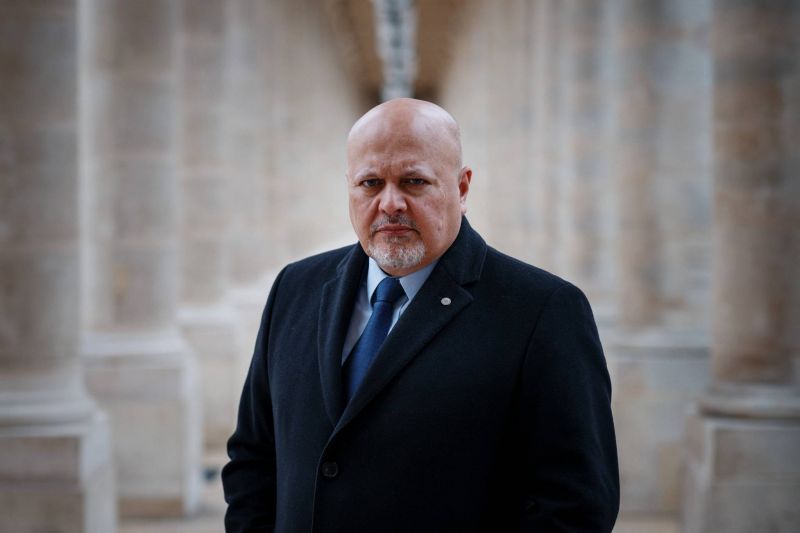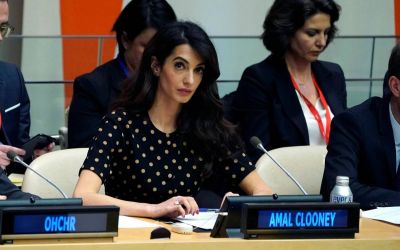
The prosecutor of the International Criminal Court Karim Khan poses during an interview with the AFP in the Honor Court of the Royal Palace, in Paris, Feb. 7, 2024. (Credit: Dimitar Dilkoff/AFP)
The prosecutor for the International Criminal Court (ICC), Karim Khan, applied to the court's Pre-Trial Division on May 20 for arrest warrants against Israeli Prime Minister Benjamin Netanyahu and Defense Minister Yoav Gallant, as well as three Hamas leaders, Yahya Sinouar, Mohammad Deif, and Ismail Haniyeh.
The warrants have been requested under the charge of alleged war crimes and crimes against humanity. The ICC's decision caused a wave of reactions — for and against — from around the world, as Israel's war on Gaza remains in full force. Israel, which stands accused of genocide at the International Court of Justice (ICJ), has killed more than 35,000 people in Gaza, the overwhelming majority civilians.
The charges and legal proceedings
- The charges against the Israeli leaders include "deliberate starvation of civilians," "intentional homicide," and "extermination and/or murder."
- Hamas leaders face accusations of "extermination," "rape and other sexual violence," and "hostage-taking as a war crime."
In January, Khan appointed an advisory group of eight international law experts and former ICC judges to review evidence and “assist him in his investigation of the situation in the State of Palestine." The group included prominent British-Lebanese human rights lawyer Amal Clooney. Along with five of her colleagues, Clooney penned a letter to the Financial Times, “Why we support the ICC's prosecution of crimes committed in Israel and Gaza.”
According to the Wall Street Journal, it might be August before the Pre-Trial Division at the ICC reaches a decision regarding Khan's request for the arrest warrants.
Established in 2002 in The Hague, the International Criminal Court, under the 1998 Rome Statute, is responsible for prosecuting war crimes, genocide and crimes against humanity.
Reactions
- Netanyahu rejected "with disgust the Hague prosecutor's comparison between Israel and Hamas mass murderers," while Gallant described the request for arrest warrants as "despicable."
- Hamas "strongly condemned" the prosecutor's decision, labeling it an attempt to "equate the victim with the executioner." The Palestinian Authority has not publicly commented, but the Palestinian Liberation Organization (PLO) emphasized the ICC's duty "to issue arrest warrants for Israeli officials who are committing crimes of genocide in the Gaza Strip."
- Several countries, including France, have spoken up in support of the ICC's legitimacy and independence. The European Union's foreign policy chief Josep Borrell highlighted that ICC member states must enforce its decisions.
- On the other hand, US President Joe Biden criticized the tribunal's move as "outrageous," claiming it wrongly equated Netanyahu and Gallant's actions with those of Hamas leaders. Secretary of State Antony Blinken warned that the decision might disrupt American efforts to end the conflict.
Context and Implications
By mid-November, five countries had requested an ICC probe into the war — the prosecutor's action came on the 227th day of the Gaza conflict. Khan has repeatedly called for the release of all hostages held by Hamas in Gaza and cautioned against an Israeli military operation in Rafah.
No arrest warrants have ever been issued against Israeli officials. "These measures against a democratic country in the midst of war are unprecedented," noted Haaretz. The investigation targets politicians, not military officers, emphasizing the use of civilian starvation as a war tactic. Haaretz stipulates that this suggests the prosecutor's difficulty in proving intentional civilian murders by Israeli forces.
Should the Court approve these requests, the warrants would place Israeli and Hamas leaders at risk of arrest and transfer to The Hague. The ICC doesn't have its own police force and relies on member states for arrests — if those named on the arrest warrants enter any of the 124 ICC member countries, they are obliged to arrest the accused. Neither Israel nor the US are ICC members.
Stephen Rapp, former US ambassador-at-large for war crimes issues, told the New York Times that "Israel will become more isolated" following this action. Israeli officials "will find it difficult to travel in two-thirds of the world" if these warrants are issued, though he pointed out that "Israel has shown itself to be somewhat immune to international pressure."
